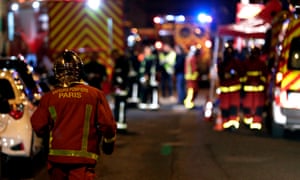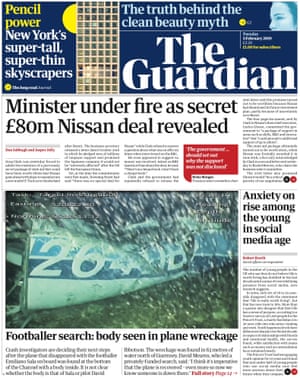
Top story: Facebook, Instagram told to shield young minds
Good morning, Warren Murray here with your primer at the gates of dawn.
Feelings of inadequacy driven by social media are driving a loss of hope in life among new people, a study suggests. The government has signalled it will make social media firms sign a legally binding code of conduct that imposes on them a duty of care towards young users. It has been reported that the digital minister, Margot James, will say in a speech today for Safer Internet Day: “The tragic death of Molly Russell is the latest consequence of a social media world that behaves as if it is above the law.”
A YouGov study found the number of young people in the UK who say they do not believe that life is worth living has doubled in the last decade. Just under half of young people who use social media feel more anxious about their future when they compare themselves to others on sites and apps such as Instagram, Twitter and Facebook. More than half (57%) think social media creates “overwhelming pressure” to succeed.
Deadly fire in Paris – In breaking news this morning, an apartment building fire in Paris has killed at least seven people. About 200 firefighters tackled the blaze in the eight-storey block, located in the 16th arrondissement.

Another 27 people were injured including three firefighters. “We had to carry out many rescues, including some people who had taken refuge on the roofs,” said fire service spokesman Clement Cognon. The fire is thought to have broken out around 1am. At time of writing, the story continues to develop with crews still at the scene.
Where we’re at with Brexit – Theresa May will today begin a two-day visit to Northern Ireland intended to show she is committed to avoiding a hard border with the Republic. While she’s there an “alternative arrangements working group” made up of Conservative backbenchers, ministers and civil servants will reconvene in Westminster to try and find something to replace the backstop. Tony Blair writes for the Guardian today: “As every day passes, we are doing damage to Britain. Economic confidence inside and outside the country is corroding; and our reputation as the nation of ‘common sense’ is being severely undermined.” Meanwhile Stephen Moss writes that “an Irish grandparent is now the most prized possession in the land, giving the proud owner the right to an Irish (and thus an EU) passport … When we asked Guardian readers who have applied for citizenship elsewhere to get in touch, more than 1,100 people replied.” Many were going for Irish, German, French, Belgian or Swedish citizenship but there were a surprising number of applications for Latvian citizenship – some from descendants of Latvians who fled to the UK after the Soviet takeover of 1944.
Venezuela ‘civil war’ warning – Nicolás Maduro’s former chief of staff writes today that while Maduro’s government has left Venezuela in a “disastrous economic and social situation”, other countries should be careful what they wish for in backing Juan Guaidó, the self-declared interim president. The legacy of Hugo Chávez may have been mishandled by Maduro but its roots run deep in politically polarised Venezuela, explains Temir Porras Ponceleon, who warns of a bloody civil war if the president is forced out. “The Chavismo social movement counts millions of supporters, primarily from lower-income communities, and is strongly embedded within the military … Venezuelans have a right to coexist, and they should be allowed to resolve their problems in a democratic, peaceful and sovereign manner.” Maduro himself, speaking after EU nations including Britain, Germany, Portugal and Spain threw their weight behind his challenger, has denounced what he called the “gringo” plot to throw him out: “I will carry on governing, together with the people, for the six years I have the right to govern for.”
Now he wants to tear down walls – The US president will attempt to reboot his presidency with a State of the Union address tonight that will tout unity and economic strength. Some of the preview words released by the White House: “We can bridge old divisions, heal old wounds, build new coalitions, forge new solutions.” Bruised after he gambled and lost with the longest government shutdown in US history, Trump will call on Congress to come together on infrastructure projects and his trade deal with Canada and Mexico. Sitting behind the president will be Nancy Pelosi, the Democratic speaker who has stared him down over funding for his border wall. “Everybody will be noticing when she does clap and when she doesn’t clap,” said Benjamin Wittes from the Brookings Institution.
Neeson ‘had urge to kill’ – The actor Liam Neeson has bluntly admitted he had once “wanted to kill a black man” after a friend was raped. Neeson said it happened many years ago and he still felt shame and horror about it. “I went up and down areas with a cosh, hoping I’d be approached by somebody [for a fight] – I’m ashamed to say that – and I did it for maybe a week. It’s awful. But I did learn a lesson from it, when I eventually thought, ‘What the fuck are you doing?’” The recounting is given in an interview with the Independent as Neeson promotes his new film Cold Pursuit. Neeson said growing up in Northern Ireland during the Troubles had also affected his sense of permissible violence. “I knew a couple of guys that died on hunger strike … I understand that need for revenge, but it just leads to more revenge, to more killing and more killing … But that primal need, I understand.”
Chips are down – Can’t blame Brexit for this one. British chips have been left an inch shorter by the 2018 heatwave, according to a report on the risks of climate change to UK fruit and vegetable growing. Yields of carrots and onions were also sharply down. Cedric Porter, editor of World Potato Markets (subscribe today!), said chips were 3cm shorter on average in the UK: “Smaller potatoes means smaller chips.” The summer of 2018 was the joint hottest on record, with some places not seeing any rain for 58 days. The lack of water resulted in the fourth lowest potato harvest in the last 60 years. In its report Recipe for Disaster, the Climate Coalition warns that three-quarters of Britain’s potato-growing land could be unusable 2050. The report calls for urgent reductions of carbon emissions and food waste by, for example, eating more wonky veg.
Lunchtime read: Battle for the skies over Big Apple
“Poking up above the Manhattan skyline like etiolated beanpoles, they seem to defy the laws of both gravity and commercial sense. They stand like naked elevator shafts awaiting their floors, raw extrusions of capital piled up until it hits the clouds.”

Oliver Wainwright, the Guardian’s architecture critic, thus describes the “pencil towers” that have sketched themselves into the New York skyline in recent years. They are the product of advances in construction technology and a global surfeit of super-rich buyers – but also a zoning policy that lets a developer acquire unused airspace nearby, add it to their own lot, and erect a vast structure without any kind of public review process. “The face of New York is changing at a rate not seen for decades, and the deals that are driving it are all happening behind closed doors.”
Today in Focus podcast: Is climate change worse than we thought?
David Wallace-Wells, author of new book The Uninhabitable Earth, depicts a world ravaged by climate chaos. India Rakusen talks to the author about why he thinks we are underestimating the impact climate change is going to have on the environment. Plus: the Guardian’s Helen Pidd on the consequences that Brexit uncertainty is having for the north of England.

Sport
With the weight of history threatening to pin them down, Liverpool’s title charge lost further momentum in a 1-1 draw with West Ham on an evening of suffocating tension. Maro Itoje is set to miss England’s Six Nations matches against France and Wales and may be out for the rest of the tournament, because of knee ligament damage. And the family of the footballer Emiliano Sala are desperate for the plane he was travelling in to be recovered from the seabed after it emerged that a body had been spotted in the wreckage.
Mark Wood has scarcely known an England dressing room as quiet as that which followed the 10-wicket defeat in Antigua. But despite joking about tension between batsmen and bowlers, the Durham quick insists team unity remains strong. Course officials at Cheltenham are taking the highly unusual step of moving a fence to reduce risks for horses and jockeys at the Festival meeting next month. And the sports minister, Mims Davies, is to hold an urgent summit with football leaders to discuss how to stamp out the growing problems of racist, homophobic and antisemitic chanting at matches.
Business
Shares have been lower in most of the markets open in Asia, with those in mainland China and much of the region taking a break for the lunar new year. Stocks edged lower in Japan and India but surged 2.1% in Australia following a report on banking malpractice that was less severe than anticipated. The weak showing followed a day of gains on Wall Street as buying of technology companies outweighed losses in health care, materials and utilities stocks. The FTSE is tracking to open higher while the pound has been trading at $1.303 and €1.140 overnight.
The papers
It is all about Brexit bungs to Nissan and Liam Neeson’s extraordinary admission to having wanted to kill a black person in revenge for the rape of a friend. The Independent, which secured the Neeson interview, carries a mournful image of him rather than the macho options used elsewhere. Its splash is the admission that ministers quietly offered Nissan millions to keep making cars in a post-Brexit UK. The Guardian focuses on business secretary Greg Clark’s previous denials of any “special deal”: “Minister under fire as secret £80m Nissan deal revealed”. The main image is the underwater wreck of Emiliano Sala’s plane, with a third story on social media driving anxiety among the young.

The Telegraph goes with Clark and Nissan, and the FT follows a similar vein but tops it with Theresa May facing pressure to rule out no deal. The Timesputs a pugilistic Neeson image front and centre, and revels in Europe’s Martin Selmayr being rebuffed by ERG MPs over his offer to beef up protections against a backstop. The Mail also features an aggressive-looking Neeson and dusts off its “At last …” headline, this time for its exclusive on plans to make social media companies protect young people online in the wake of the death of Molly Russell. The i wins the award for most positive Brexit coverage, giving its front page to Angela Merkel’s “olive branch” to the UK, after the German chancellor suggested a bit of creativity could help seal a deal. The Express says Ofgem is about to approve one of the biggest energy price rises in a decade, while the Mirror focuses on its Fair Care For All campaign, reporting that 600 people are day are leaving their jobs to look after sick relatives. The Sun says Love Island’s Jack Fincham is sorry for taking cocaine, and gives its front-page sub a thankless task with a narrow Neeson headline. “Neeson in racist kill bid outrage” is the result.
[“source=theguardian”]